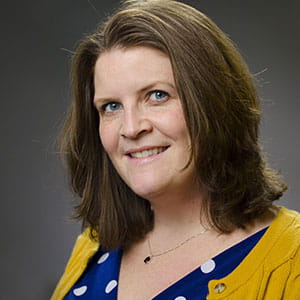Q&A With Graduate College Dean and Executive Vice Provost James Herbert
 By Katie Clark
By Katie Clark

- Breaking Through the Ice Ceiling at the Olympics
- Drexel University's Recent Academic Activity: Sponsored Opportunities and New Partnerships From Fall 2025
- Faculty Highlights: Recent Awards and Grants from Fall 2025
- ADHD Symptoms Predict Distinct Creative Problem-Solving Styles and Superior Solving Ability

If you see students with empty coffee mugs walking toward Main Building, headed in the general direction of the third floor, you can bet where they’re are going: to the sleek gourmet coffee machine in the new home of Drexel’s Graduate College. More than likely, they’ll get to chat with Dean and Executive Vice Provost James Herbert, PhD, or any number of his team, who greet visitors with a warm “welcome home” smile. But now, as the Graduate College celebrates its one-year anniversary, there is so much more to talk about than the coffee.
For the past decade, Drexel has been supporting its graduate students through the former Office of Graduate Studies, but the establishment of the college has elevated those efforts to an entirely new level. Ask Herbert about his plans, and you won’t get a word in edge-wise. He’s excited. He’s energized. And here, Herbert tells Drexel Quarterly about a successful first year and what’s ahead.
First off: Happy anniversary! What has it been like this first year?
Well, there is a lot more work to be done, but I feel really good about the progress we’ve made — and not just the concrete things we’ve accomplished, but the projects we’ve put in place going forward. We’re still working to develop a few new projects and a lot will be rolling out this fall. There is a definitely a lot of energy about the office.
Ultimately, we have a goal of supporting our current grad students — they are such a crucial part of the University — as well as increasing enrollments. We’ve come up with some great ideas to make that happen and they are now beginning to become a reality.
Great. Let’s jump right in. Tell us what’s in store for the Graduate College in its second year.
Some of our biggest projects in the next year are improving the student experience, enhancing our professional development activities, rolling out a number of new initiatives — which we’ll dive into a bit later — and ultimately, increasing enrollment. Right now we serve just over 9,100 students. I’d like to see that number increase to around 12,000.
A lot of the work we do is transactional. We are a touch point for each and every grad student. One of our initiatives is to improve the student experience on an operational level. For instance, we’ve historically required students to use paper for most transactions, but now we’re moving quickly toward digitization. The goal is to eventually eliminate paper altogether.
Another thing we’ve started this first year and will continue is academic program development and oversight. In close partnership with each of the colleges and schools, we did a deep dive into each master’s program and asked, “Is this program really viable? Is it being marketed well?”
What we found is that we have too many programs that are far too generic. They are good programs, but they aren’t sufficiently different from our competitors to justify our price, which is often higher. So we’ve charged the program directors to rethink their programs, to ensure that they’re clearly distinctive, and align well with a market. We’ve had a big push this year to work with the colleges to change the culture and help people understand the importance of distinctiveness — what we call the “Drexel difference.”
Alongside our efforts to enhance our existing programs is the development of new programs. That’s where the MPV initiative comes in.
What is the MPV initiative?
Market-Driven Academic Program Ventures, or MPVs, is a University-wide competition, held in partnership with the Office of the Provost, to surface ideas for new, highly innovative interdisciplinary graduate programs. It was something that Provost M. Brian Blake, PhD, brought to the table once he started in August 2015.
We had the idea to take key intersections of talent that we have at Drexel and create something new that doesn’t exist anywhere else. With very short lead time and very little advertising, we got 25 applications from across the University in April for some really cool, really innovative ideas that ranged from beginning-stage startup ideas to things that were close to being ready for launch. We only had a limited pot of money so we awarded five of the proposals in July and they are being rolled out as new programs beginning as early as this fall.
Some examples are an MFA in creative writing (a partnership between the College of Arts and Sciences and Westphal), a master’s in peace engineering (a partnership with the College of Engineering and several other schools), and a master’s in Urban Strategy, which taps into talent from the Lindy Institute for Urban Innovation and several other schools across the University. We expect a pretty quick return on investment — based on projections, the programs are expected to be in the black by year two or three.
You mentioned a heavier focus on professional development; can you elaborate?
Some students at Drexel have gotten very rich professional development opportunities whereas other students not so much; it’s historically been a little spotty.
What we are trying to do is provide a little more centralization, with better coordination. So, this spring we conducted a University-wide survey of graduate students, faculty and staff to assess what their thoughts were on our students’ professional development needs — what do they think are the biggest priorities, how well are we meeting them — and then we looked at the discrepancy between perceived importance of various topics and what we have actually delivered.
This fall we are rolling out regular monthly professional development seminars for grad students that target these priorities.
Tell us a little more about these seminars.
Well, as one example, we now know that nationwide the majority of PhD students are not going into academia. Traditionally, you train a PhD student to be a professor. But, the world is changing and the majority is now going into industry or, in increasing cases, to the nonprofit sector or to government jobs. However, our training models are still largely centered toward training people to be professors.
We need to develop opportunities for students to adapt and to embrace this new reality and to learn the skills these non-traditional careers demand.
So, we are bringing in industry experts — partners from Lockheed Martin, for example, or from Dow Chemical or from the government or key nonprofits — to talk to our students about what work is like in these fields.
What other new offerings can graduate students expect this fall?
I’m really excited about our graduate co-ops — it’s such a distinctive thing that really sets us apart from everybody else. In partnership with the Steinbright Career Development Center, we’ve put together a six-month co-op program for our master’s students. The good news is they can still graduate within two years, and they’ll leave with the experience of a six-month co-op.
We think this is going to be very popular with two groups: the “career changer,” and also with international students, who cannot work in the country on a student visa unless it’s part of a required experience like co-op. We’ll be rolling out the first seven programs — in computer science and engineering — this fall, with the next slate of programs coming next year, and then a full rollout for any program that’s interested by fall 2018.
Similarly, another new offering for our students is graduate minors. The first three on the books are minors in computational engineering, which is primarily for engineers, as well as computer science, and then entrepreneurship, which could be plugged into any master’s program at the University.
Imagine that you get your master’s in psychology and a minor in entrepreneurship — well, with the minor you can learn how to take your theoretical and practical psychology knowledge, develop an app for something like weight loss or anxiety reduction, then roll it out into a startup.
The minor isn’t required, but it’s a very cool innovation. It’s almost like a dual master’s but it doesn’t take you longer or cost more money.
What might faculty and staff see from the Graduate College in the coming year?
For one thing, we’ve really ramped up our marketing efforts. Together with the Office of University Communications and the Office of Enrollment Management and Student Success we’ve developed a brochure, created a video and greatly increased our social media presence. We’ve also been doing a lot more advertising and direct marketing.
In partnership with those same offices, we’ll also be hosting thematic open houses this fall. We want to complement the individual college or program open houses that already exist and have open houses around themes, like health care professions, or engineering and technology — themes that go beyond just one college or school. We think these events will bring in a lot of prospective students and give us positive publicity.
We’d also like our colleagues to know we’ve been invited to join the Center for the Integration of Research, Teaching and Learning (CIRTL), a national consortium of top research universities based out of the University of Wisconsin at Madison. It’s a nice feather in our cap because it’s a highly selective group, and recognizes our forward-thinking efforts in teaching our students to teach better, so to speak. We’re going to try to play a significant role in this organization, perhaps by hosting a conference of top universities here at Drexel.
The bottom line for all of our efforts is that we want to increase graduate enrollments while improving the experience of our students. Nationwide, graduate enrollments are pretty flat — it’s an incredibly competitive market. To compete successfully in this marketplace, we have to be better. My hope is for everyone involved in any given program — from the dean to the faculty members to the administrative support staff — to be able to give you the elevator pitch for how their particular program is distinctive and better, and to be fully committed to making our students’ experience second to none.
This piece first appeared in Drexel Quarterly's Fall 2016 issue.In This Article
Drexel News is produced by
University Marketing and Communications.